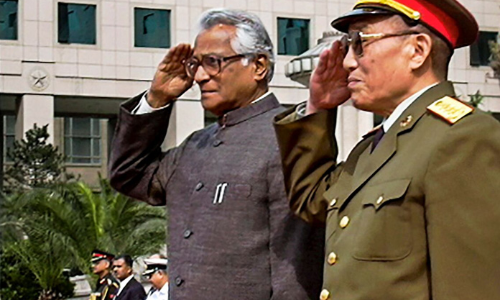George, a street-fighter committed to anti-Congressism

A fierce socialist who fought for workers be it the taxi drivers of Mumbai or railway employees, George Fernandes rose from the streets to become one of the towering personalities and remained a bitter and staunch critic of the Congress and the NehruGandhi familys dynasty politics after battling the Emergency of 197577 imposed by Indira Gandhi
A fierce socialist who fought for workers - be it the taxi drivers of Mumbai or railway employees, George Fernandes rose from the streets to become one of the towering personalities and remained a bitter and staunch critic of the Congress and the Nehru-Gandhi family's "dynasty politics" after battling the Emergency of 1975-77 imposed by Indira Gandhi.
But he also remained a puzzle as he backed the Janata Party government under Morarji Desai in Parliament on the "dual membership" issue and overnight switched to Choudhry Charan Singh, who formed a government with Congress backing in 1979. In his steadfast fight against the Congress, Fernandes did not mind joining forces with the Bharatiya Jana Sangh and later BJP.
Fernandes, 88, campaigned for the rights of the poor and the working class and left a mark with his passion, articulation, personal warmth and popularity in multifarious roles as a trade union leader, politician and a Union Minister.
A man with simple habits and tastes, he was a nine-time member of the Lok Sabha and a one-term member of the Rajya Sabha. He shot into national limelight after he defeated Congress stalwart S.K. Patil in the 1967 general election. It was a victory that earned him the reputation of a "giant killer".
Born on June 3, 1930 at Mangalore in Karnataka, Fernandes was free thinking from an early age when he had started as a religious preacher. His father wanted him to pursue law but he joined the trade union movement in his home town and P.D'Mello became his mentor.
He came to Mumbai (then Bombay) at age 19 and slept on the city's pavements in his initial days. But his enormous organisational skills saw him becoming a powerful union leader who could shut Mumbai down with a single call. He involvement with issues concerning people earned him respect and admiration.
Fernandes organised a railway strike in 1974 in which an estimated 17 lakh employees struck work. It was the time opposition to Indira Gandhi's government was reaching a peak and the strike was one of the factors that led to the declaration of Emergency on the night of June 25, 1975.
Soon Fernandes and several other political leaders went underground and he organised a counter campaign to give information about the measures taken by the Indira Gandhi's government for suppressing democracy. He disguised himself as a Sikh to carry out underground activities. He also sought to bring international pressure on the then Prime Minister using his contacts in the socialist world.
Fernandes was arrested in the Baroda Dynamite case and was imprisoned in Hisar and Tihar jails. He was not released during the 1977 Lok Sabha elections and but was elected from Muzaffarpur in Bihar by a landslide while still in prison. The photo of Fernandes with raised and hand-cuffed hands became a household image.
Fernandes became Industry Minister in the Morarji Desai government post-Emergency and was responsible for driving multinational drink manufacturer Coca-Cola out of India. It is another matter the drink made a re-entry into India later.
As Railways Minister in the V.P. Singh cabinet, he is credited with conceptualising the Konkan Railway, regarded as a challenging engineering feat. He made several visits to Siachen glacier as Defence Minister in the Atal Bihari Vajpayee cabinet to boost the morale of the soldiers.
Fernandes had to resign as Defence minister in March 2001 over "coffingate" allegations but was re-inducted months later by Vajpayee, a move against which the Congress boycotted Parliament.
A firebrand maverick who was anti-Congress in his orientation, Fernandes was General Secretary, Samyukta Socialist Party (1969-73), and Chairman, Socialist Party, and President, All India Railwaymen's Federation (1973-77). He became President of Samata Party in 1994 and Leader of Janata Dal-United Parliamentary Party in the Lok Sabha in 1999.
He served the BJP-led National Democratic Alliance as its convenor and was an effective spokesman of the alliance. He supported the causes of Tibet and Burma with passion and sincerity. His official residence often housed distressed Burmese students and members of the Tibetan community came to express their gratitude. He had close friendship with the Dalai Lama.
Fernandes won his last Lok Sabha election in 2004. A doughty fighter, Fernandes wanted to contest the 2009 Lok Sabha election but was denied JD-U ticket. He filed his nominations as an Independent from Muzaffarpur.
He married Leila Kabir in 1971 and has a son.
Fernandes made his last public appearance over nine years back as he was stuck by Alzheimer's. Following his ailment there was a tussle between Leila Kabir and his brothers and his associate Jaya Jaitley over parts of his legacy.








